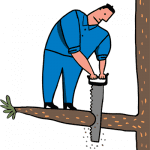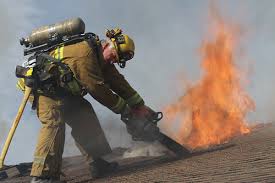 I recently read an article where the author was taking exception to the risk management maxim: ‘We will risk a lot to save a lot and risk little to save little.’ There are several variations on this maxim, including: ‘Great risks will be taken to save savable lives; Moderate risks will be taken to save savable property; and, No risk will be taken to save what is unsavable.’ Risk management is an essential component to the development and maintenance of strong situational awareness. The premise of the author was firefighting and all other high risk environments are, by its nature, risky and no catchy phrase is going to make it safer. I agree. In fact, I wholeheartedly agree. But there is fundamentally a huge difference between assuming the risk and creating the risk. Here’s what I mean…
I recently read an article where the author was taking exception to the risk management maxim: ‘We will risk a lot to save a lot and risk little to save little.’ There are several variations on this maxim, including: ‘Great risks will be taken to save savable lives; Moderate risks will be taken to save savable property; and, No risk will be taken to save what is unsavable.’ Risk management is an essential component to the development and maintenance of strong situational awareness. The premise of the author was firefighting and all other high risk environments are, by its nature, risky and no catchy phrase is going to make it safer. I agree. In fact, I wholeheartedly agree. But there is fundamentally a huge difference between assuming the risk and creating the risk. Here’s what I mean…
A video I recently watched of a structure fire demonstrates the point. First, let me say (as I often do) I am not judging the fire department operating at this emergency scene. There are plenty of pundits out there who rant from their high perches of judgment, often in non-productive and disrespectful ways. Tuck this lesson away and recall it often: When we’re judging, we cannot be learning. I hope those who visit my site are here to learn, not to pass judgment.
 In the video, the firefighters are performing vertical ventilation at a residential dwelling fire. The fire conditions are significant. It’s a little difficult to assess the building construction type but I think it is fair to surmise the structure is well on its way to losing its battle against gravity as a result of the fire weakening the components of construction.
In the video, the firefighters are performing vertical ventilation at a residential dwelling fire. The fire conditions are significant. It’s a little difficult to assess the building construction type but I think it is fair to surmise the structure is well on its way to losing its battle against gravity as a result of the fire weakening the components of construction.
Please keep in mind that all information related to fire fighting can be applied to almost every life situation and applies to most jobs out there that contain an element of risk!
Let’s apply the maxim: We will risk a lot to save a lot. Will the risk these firefighters took to create a ventilation hole be rewarded with a worthwhile outcome?
Firefighting is risky, in fact, life in general can be risky. Every firefighter knows that. But there is a big difference between assuming the risk of a fire and creating the risk by performing tasks in ways that are unsafe or inconsistent with best practices and then hiding behind the testosterone-laden mantra: We’re firefighters. That’s what we do!
I am a firefighter too. Well, at least I was one… for 30+ years. But I also had other obligations (roles) that were important to me. I was a husband, a dad, a son, and a brother (both in the biblical and fraternal sense). Maybe I was just a selfish person, but I always did everything in my power to make sure I did not create risk through my behaviors or orders and everyone who was under my command returned home to fulfill their non-firefighter obligations.
It takes a real hero to stand up for safety, especially if surrounded by others who are consumed by their self-anointed hero status. Thank you, but I’d rather be a hero to my grandson than to my widow.
Chief Gasaway’s Advice
 1. Acknowledge the risks inherent in the work we do.
1. Acknowledge the risks inherent in the work we do.
2. Learn everything possible about how people get hurt and killed by reading near-miss and line-of-duty death reports.
3. Discuss how to manage risk by using best practices.
4. Ensure the risks being taken are worth the potential reward.
5. Train on SOMETHING every day. The way to ensure peak performance is to make incremental improvements over time.
6. Learn from the outcomes. Even when the outcomes are good, ask “Did our actions make sense? What were the potential risks? What was the reward we were trying to accomplish?
Action Items
 1. Describe what your department or company does to support taking appropriate risks based on rewards.
1. Describe what your department or company does to support taking appropriate risks based on rewards.
2. If your department had a similar experience (e.g., members were creating risk by performing tasks that do not match the conditions) how would you learn from it?
3. Have you ever found yourself performing tasks that did not justify the risk? Did you stop or did you continue?
_____________________________________________________________
_____________________________________________________
If you are interested in taking your understanding of situational awareness and high-risk decision making to a higher level, check out the Situational Awareness Matters Online Academy.
CLICK HERE for details, enrollment options and pricing.
__________________________________
Share your comments on this article in the “Leave a Reply” box below. If you want to send me incident pictures, videos or have an idea you’d like me to research and write about, contact me. I really enjoy getting feedback and supportive messages from fellow first responders. It gives me the energy to work harder for you.
Thanks,

Email: Support@RichGasaway.com
Phone: 612-548-4424
Facebook Fan Page: www.facebook.com/SAMatters
Twitter: @SAMatters
LinkedIn: Rich Gasaway
YouTube: SAMattersTV
iTunes: SAMatters Radio


Thank you as always!!!!!!!
I appreciate your support VERY much!
Staying with your theme, how much risk are we creating when: 1. We ignore recent research that identifies methods that are not only more safe, but more effective. 2. We are teaching outmoded tactics in the class room based on unproven theory. The research I am talking about is both the recent Spartanburg and the Kill The Flashover burns. Both of this controlled research events replicated our actual conditions very effectively. yet the same firefighters that make the comments that you allude are finding all types of excuses to ignore the evidence. My question is how do we overcome the willful ignorance and move the US fire service on the right tract?
I wish I knew how to get people to overcome willful ignorance. I haven’t got that one figured out yet. The best any of us can do is educate and use influence to try to change ignorance.
Pingback: Situational Awareness Survey - Situational Awareness Matters!™Situational Awareness Matters!™